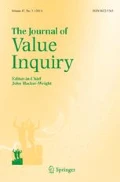References
See James Rachels, “The Challenge of Cultural Relativism,” in James Rachels, ed., The Elements of Moral Philosophy, 3rd edn. (New York: Random House, 1999). Also see Carl Wellman, “The Ethical Implications of Cultural Relativity,” The Journal of Philosophy 55, (1963) and Paul K. Moser and Thomas L. Carson, eds., Moral Relativism: A Reader (New York, Oxford: Oxford University Press, 2001).
David McNaughton, Moral Vision (Oxford: Basil Blackwell, 1988), p. 40.
Henry Sidgwick, The Methods of Ethics (London, New York: Macmillan, 1901), p. 209.
See John Stuart Mill, On Liberty, ed. by Gertrude Himmelfarb (London: Penguin, 1985).
See John Rawls, Political Liberalism, 2nd edn. (New York: Columbia University Press, 1996).
G.E. Moore, Principia Ethica (Buffalo, N.Y.: Prometheus Books, 1988), p. 143.
Ibid.
Simon Blackburn, Ruling Passions (Oxford: Oxford University Press, 1998), p. 310.
John Rawls, A Theory of Justice (Cambridge, Mass.: Harvard University Press, 1971), p. 42.
Ibid., p. 120.
Robert Brandom, Making it Explicit (Cambridge, Mass.: Harvard University Press, 1994), p. 41.
See Thomas Reid, Essays on the Active Powers of the Human Mind, Introduction by Baruch Brody (Cambridge, Massachusetts, and London, England: The MIT Press, 1969). Also see William P. Alston, The Reliability of Sense Perception (Ithaca, New York: Cornell University Press, 1993).
See Alston, op. cit.
H.A. Prichard, “Does Moral Philosophy Rest on a Mistake?,” Mind 21 (1912).
See Moore, op. cit. Also see W.D. Ross, The Right and the Good, ed. by Philip Stratton-Lake (Oxford: Oxford University Press, 2002), p. 12. Also see Sidgwick, op. cit., p. 32 and Reid, op. cit., p. 229.
J.L. Mackie, Ethics: Inventing Right and Wrong (Hammondsworth, England: Penguin, 1977), p. 37.
Ibid., p. 36.
W.D. Ross, Foundations of Ethics (Oxford: Oxford University Press, 1968), p. 19.
Reid, op. cit., p. 481.
Ibid., p. 248.
Ross, op. cit., p. 25.
Mackie, op. cit., pp. 36 and 37.
See Michael DePaul, Balance and Refinement: Beyond Coherence Methods of Moral Inquiry (London: Routledge, 1993).
Reid, op. cit., p. 247.
See Thomas Nagel, The View from Nowhere (Oxford: Oxford University Press, 1986).
I would like to thank Thomas Magnell and an anonymous referee for their extremely helpful comments on earlier versions of this paper.
Author information
Authors and Affiliations
Corresponding author
Rights and permissions
About this article
Cite this article
Roeser, S. Intuitionism, Moral Truth, and Tolerance. J Value Inquiry 39, 75–87 (2005). https://doi.org/10.1007/s10790-006-3338-6
Issue Date:
DOI: https://doi.org/10.1007/s10790-006-3338-6

